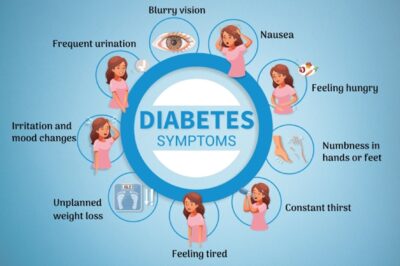Are you struggling to lose weight even though you’re doing everything right? If you have diabetes, you might be facing challenges that others don’t.
Understanding how diabetes can affect your weight loss efforts is key to finding the right approach for your body. You’ll discover why shedding pounds can be harder with diabetes and what you can do to overcome these obstacles. Keep reading to unlock simple, effective tips that could change the way you manage your health and achieve your goals.

Diabetes And Weight Loss Link
Diabetes can make losing weight harder for many people. It changes how the body uses food and stores fat.
Understanding how diabetes affects weight loss helps with better health choices. This guide explains the connection clearly.
How Diabetes Influences Metabolism
Diabetes changes the way your body turns food into energy. It slows down metabolism, making weight loss tough.
When metabolism is slow, the body burns fewer calories. This can cause more fat to build up over time.
Role Of Insulin In Weight Management
Insulin helps move sugar from blood into cells for energy. People with diabetes may have insulin problems.
Too much insulin can lead to fat storage. This makes it harder to lose weight, even with diet and exercise.
- High insulin levels increase hunger
- More insulin encourages fat storage
- Low insulin makes it hard for cells to use sugar

Challenges In Losing Weight With Diabetes
Losing weight can be hard for people with diabetes. This condition changes how the body handles sugar and insulin.
These changes bring unique challenges that make weight loss slower and more complex.
Impact Of Blood Sugar Fluctuations
Blood sugar levels often go up and down in people with diabetes. These swings affect hunger and energy.
When blood sugar drops, the body feels weak and hungry. This can lead to eating more than planned.
Medication Effects On Weight
Some diabetes medicines cause weight gain. They may increase appetite or cause water retention.
Other medicines help with weight loss, but they might have side effects to watch for.
- Insulin can increase fat storage
- Sulfonylureas may raise hunger
- GLP-1 agonists often reduce weight
Common Misconceptions
Many people think diabetes always causes weight gain. This is not true for everyone.
Another myth is that people with diabetes cannot lose weight at all. Weight loss is possible but may take more effort.
Effective Weight Loss Strategies For Diabetics
Weight loss can be harder for people with diabetes. This is because diabetes affects how the body uses insulin and stores fat.
Using the right strategies can help diabetics lose weight safely and improve their health.
Balanced Diet Tips
A balanced diet helps control blood sugar and supports weight loss. Choose foods that give steady energy and avoid spikes in blood sugar.
Focus on whole foods like vegetables, fruits, lean proteins, and whole grains. Limit sugary snacks and drinks.
- Eat smaller, regular meals to keep energy steady
- Include fiber-rich foods to improve digestion
- Choose healthy fats like nuts and olive oil
- Avoid processed and high-sugar foods
Exercise Recommendations
Exercise helps burn calories and improves insulin sensitivity. Aim for regular physical activity that is safe and enjoyable.
Mix different types of exercise to get the best results for weight loss and blood sugar control.
- Try at least 150 minutes of moderate exercise per week
- Include aerobic activities like walking or cycling
- Add strength training to build muscle
- Stretch to improve flexibility and reduce injury risk
Monitoring And Adjusting Blood Sugar
Watching blood sugar levels helps manage diabetes and supports safe weight loss. Check your levels before and after meals and exercise.
Adjust your diet and activity based on your blood sugar readings. Talk to your doctor about any needed changes in medicine or insulin.
- Keep a daily log of blood sugar readings
- Note how foods and exercise affect your levels
- Work with your healthcare team for guidance
- Be aware of signs of low or high blood sugar
Success Stories And Scientific Findings
Diabetes can change how the body handles weight loss. Some people find it harder to lose weight because of blood sugar issues.
Stories from real people and recent studies help us understand this better. They show what works and what does not.
Real-life Weight Loss Experiences
Many people with diabetes share their weight loss journeys. They often face challenges like slow metabolism or medication effects.
Success comes with changes in diet, exercise, and managing blood sugar. Small steps can lead to steady weight loss.
- Choosing low-carb meals helps control blood sugar and reduces hunger.
- Regular walking or light exercise improves insulin sensitivity.
- Tracking food intake helps avoid overeating and unhealthy choices.
- Support from doctors and family increases motivation and success.
Recent Research Insights
Scientific studies show diabetes can slow weight loss but does not stop it. Managing insulin and blood sugar is key.
Research finds that personalized plans work best. Combining diet, exercise, and medication helps people lose weight safely.
- Low glycemic index foods lead to better blood sugar control and weight loss.
- Intermittent fasting may improve insulin response in some patients.
- Medications like GLP-1 receptor agonists aid weight loss in type 2 diabetes.
- Regular physical activity improves muscle use of glucose, helping weight loss.
Preventing Weight Gain While Managing Diabetes
Diabetes can make it hard to control your weight. Blood sugar changes affect how your body stores fat.
Keeping a healthy weight helps manage diabetes better. It lowers the risk of heart problems and other issues.
Lifestyle Habits To Adopt
Good habits help prevent weight gain and improve diabetes control. Regular exercise and healthy eating are key.
Try to eat balanced meals with fiber, lean protein, and healthy fats. Avoid sugary drinks and snacks.
- Eat small, frequent meals to keep energy steady
- Choose whole grains instead of refined carbs
- Include vegetables in every meal
- Drink plenty of water throughout the day
- Exercise for at least 30 minutes most days
Avoiding Common Pitfalls
Some habits can cause weight gain even if you try to manage diabetes. Watch out for hidden sugars and inactive time.
Medicines may affect your appetite or metabolism. Talk to your doctor if you notice weight changes.
- Don’t skip meals; it can cause overeating later
- Avoid sugary drinks like soda and juice
- Limit processed and fast foods high in fat
- Keep track of your weight regularly
- Stay active even on busy days

Frequently Asked Questions
Can Diabetes Make Weight Loss Harder?
Yes, diabetes can slow weight loss due to insulin resistance and blood sugar imbalances. These factors affect metabolism and fat storage. Managing blood sugar levels and following a healthy diet help improve weight loss efforts for diabetics.
How Does Insulin Affect Weight Gain Or Loss?
Insulin helps regulate blood sugar but can promote fat storage if levels are high. Excess insulin may cause weight gain and make losing weight harder. Controlling insulin through diet and medication supports better weight management.
Does Diabetes Medication Impact Weight Loss?
Some diabetes medications cause weight gain, while others aid weight loss. For example, insulin and sulfonylureas may increase weight. GLP-1 receptor agonists often help reduce weight. Consult your doctor about medication effects on weight.
Can Weight Loss Improve Diabetes Control?
Yes, losing weight improves insulin sensitivity and blood sugar control. Even a small weight loss of 5-10% reduces diabetes complications. A balanced diet and regular exercise are key for effective weight loss and diabetes management.
Conclusion
Managing diabetes can impact weight loss efforts. Blood sugar levels play a role. Insulin resistance may slow down progress. Consistent monitoring helps maintain balance. Healthy eating supports weight goals. Regular exercise boosts metabolism and energy. Consult healthcare professionals for personalized advice.
Everyone’s journey is unique. Understanding diabetes is key. Stay informed and patient. Small changes lead to big results over time. Remember, persistence pays off. Stay motivated and keep pushing forward. You can achieve your weight loss goals while managing diabetes.



